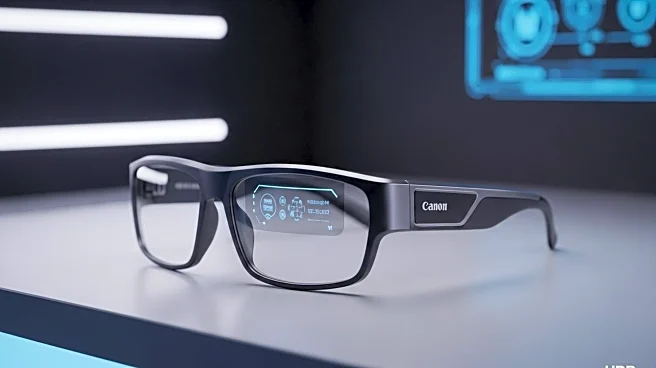What is the story about?
What's Happening?
Meta has launched its new Ray-Ban Display glasses, priced at $799, which integrate advanced wearable technology. These glasses feature a heads-up display controlled by a neural wristband that uses electromyography to detect neural impulses, allowing users to interact with the display through hand gestures. The glasses, which resemble Meta's previous Ray-Ban and Oakley models, offer a high-resolution screen in one eye and are designed to be stylish yet functional. The neural wristband enhances the user experience by enabling gesture-based control, setting these glasses apart from earlier models like Google Glass.
Why It's Important?
The introduction of Meta's Ray-Ban Display glasses marks a significant advancement in wearable technology, potentially transforming how users interact with digital content. This innovation could impact various sectors, including consumer electronics and augmented reality applications, by offering a more immersive and hands-free experience. The glasses' ability to integrate with everyday activities, such as navigation and real-time information retrieval, could lead to broader adoption of augmented reality in daily life. However, challenges such as limited battery life and the need for additional charging accessories may affect user convenience and adoption rates.
What's Next?
As Meta continues to develop its wearable technology, future iterations of the Ray-Ban Display glasses may address current limitations, such as battery life and app integration. The company might also expand the glasses' functionality to include more applications and improve user experience. Stakeholders in the tech industry will likely monitor consumer feedback and adoption rates to gauge the potential market impact. Additionally, regulatory considerations regarding safety, especially while driving, may influence future design and functionality enhancements.
Beyond the Headlines
The development of Meta's Ray-Ban Display glasses raises questions about privacy and data security, as the integration of wearable tech into daily life could lead to increased data collection. Ethical considerations regarding user consent and data usage policies will be crucial as these technologies become more prevalent. Furthermore, the cultural acceptance of augmented reality devices in public spaces may evolve as these technologies become more mainstream.















